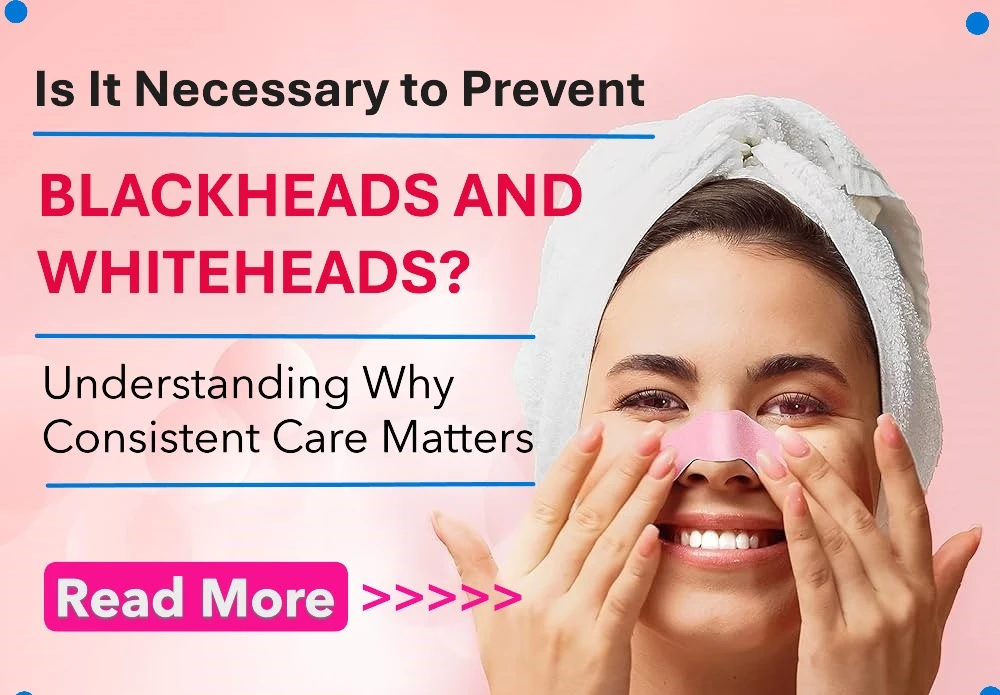Is It Necessary to Prevent Blackheads and Whiteheads? Understanding Why Consistent Care Matters
Is It Necessary to Prevent Blackheads and Whiteheads? Understanding Why Consistent Care Matters
Blackheads and whiteheads are among the most common forms of acne, affecting people of all ages and skin types. While they may seem harmless compared to inflamed pimples or cystic acne, preventing blackheads and whiteheads is more important than many realize. Let’s explore why consistent care to stop these clogged pores from forming matters—not just for clearer skin but also for long-term skin health.
What Are Blackheads and Whiteheads?
Both blackheads (open comedones) and whiteheads (closed comedones) form when dead skin cells, oil (sebum), and sometimes bacteria accumulate in pores. The difference lies in whether the pore remains open or closed:
-
Blackheads: The pore stays open, and the buildup oxidizes, turning dark.
-
Whiteheads: The pore remains closed, keeping the contents beneath the skin, resulting in small, flesh-colored bumps.
Though neither usually causes pain, they can lead to texture issues, visible congestion, and sometimes progress into more severe acne if untreated.
Why Prevention Is Important
-
Minimize the risk of inflamed acne:
Blackheads and whiteheads are considered non-inflammatory acne, but when bacteria multiply inside these clogged pores, they can develop into red, swollen pimples or even painful nodules and cysts. Preventing them helps reduce the chances of breakouts becoming more severe. -
Reduce long-term skin texture issues:
Frequent or untreated clogged pores can contribute to uneven skin texture and enlarged pores over time. Keeping pores consistently clear helps skin look smoother and healthier. -
Lower the risk of post-acne marks and scarring:
Even non-inflamed lesions can sometimes leave behind pigmentation, especially in people with medium to darker skin tones. Preventing breakouts helps reduce the likelihood of post-inflammatory hyperpigmentation (PIH) or, in severe cases, scarring. -
Promote healthier, balanced skin:
When pores stay clear, the skin barrier can function better, maintaining its natural oil balance. This helps skin stay hydrated yet less greasy, improving overall appearance.
How to Prevent Blackheads and Whiteheads
While you can’t always stop them entirely—especially if you have oily or acne-prone skin—consistent care can greatly minimize their occurrence:
-
Cleanse daily: Use a gentle cleanser twice a day to remove oil, dirt, and makeup.
-
Exfoliate smartly: Incorporate chemical exfoliants like salicylic acid (a BHA) to help dissolve oil and dead skin inside pores. Use them 2–3 times a week or as your skin tolerates.
-
Use non-comedogenic products: Choose skincare and makeup labeled “non-comedogenic” to avoid additional pore-clogging ingredients.
-
Moisturize properly: Even oily skin needs hydration. Lightweight, oil-free moisturizers help balance skin and prevent it from producing excess oil.
-
Consider retinoids: Over-the-counter retinol or prescription retinoids can boost cell turnover, reducing clogged pores and keeping skin clear over time.
Bottom Line
Preventing blackheads and whiteheads isn’t just about aesthetics—it’s an important part of maintaining overall skin health and avoiding more severe acne issues down the road. With consistent, gentle care and targeted products, you can greatly reduce clogged pores, keep your complexion smoother, and protect your skin from future damage.
In short, prevention is not only necessary—it’s a proactive step toward clearer, healthier, and more confident skin.

Related Blog
What Causes Oily Skin and Can It Be Managed Naturally? Exploring Root Causes and Gentle Solutions
Aug 2, 2025 by Admin
General
What Are the Signs That You Have Sensitive Skin? Key Symptoms to Help You Identify This Delicate Skin Type
Aug 1, 2025 by Admin
General